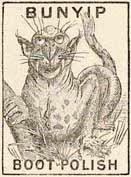ONE of parenthood’s joys (there are not many) is the satisfaction to be drawn from knowing when to remain absolutely silent. One might, for example, look up from a bedtime storybook at just that the precise instant when the apple-cheeked fruit of your loins falls at long last into merciful slumber. Hush, that hard-wired wisdom whispers, don’t make a sound or your precious cherub will stir, scream and be possessed by Satan once more, for it is only Old Scratch who could sentence an adult to nightly readings over the course of interminable months of Tiger Tim (who belonged to Mr Bingo’s circus) and the mystery of Clarence Camel’s missing hump.
If an ill-advised word were to set Junior stirring as you slip from the room all hope of a long glass and, if you have behaved yourself, a short smooch with your progeny’s co-producer, will be banished by a renewed bout of fury and maniacal screeching.
As the young ’uns grow and explore their little worlds, silence will also best suit those moments when naughtiness is in progress. Yes, the Black Dog cannot possibly think kindly of having had a crayon stuffed up its sniffable end, but it is a placid creature and unlikely to make too much of a fuss. So why should you? The lad’s fascination with canine hindquarters will fade, and to rebuke him just now could be to sow the seeds of mental infirmity in later life. The scars, the shame, the remembered sounds of a father’s fury – they might in years to come propel an adolescent into the arms of leftist causes, for it is the unresolved conflict with authority figures that appears to inspire so many pro-carbon tax chanters, G20 protesters, and commenters at the Phage and ABC websites. Let the Black Dog work it out, so to speak, and utter not a word of rebuke in the meantime. When relatives are bitten, aunts refused a kiss, teachers kicked or food flung, emit not a peep. It can only make things worse.
This was the philosophy followed for the most part at the Billabong, certainly when Mrs Bunyip was out shopping and the Professor was handling parental duties, and it is good to see that others are now embracing the wisdom of saying nothing when little darlings get out of line. Case in point, of course, is the Fairfax press, where editors of the old, stern school might have been moved to inform their readers of Larissa Behrendt’s dark words about another woman of a good deal more colour. Those days are gone, as are all the dinosaur news editors and their outmoded notions of what constitutes a matter of public interest. Unable to grasp the nuanced, post-modern sensibility that these days determines what news is fit to print, the old guard was disappeared. By their reckoning a story was worth reporting if people were likely to talk about it. Today, it is those very stories, the ones that might set people to chattering, which need to be spiked, especially if the subject of that talk happens to be a very special and favourite person.
So far, as Keith Windschuttle points out, not a word about the Behrendt tweet has passed into print at The Phage, The Silly, The Finis or online. Some may see this as sniveling cowardice with a dash of shame, as the Fairfax papers have been amongst the high-flying Ms Behrendt’s most ardent supporters, admirers and publicists. Reporting her bitchy eruption could only prompt public speculation that all the prior ink and adulation were squandered on an arrogant, intolerant and undeserving wretch.
Worse might be the consequences for Behrendt, whose profile the Fairfax papers have so assiduously polished. With a Labor-appointed judge about to rule on Behrendt’s gripe with Andrew Bolt exercise of free speech, the knowledge that she is herself quite capable of giving offence might colour his decision. And the Behrendt fan club couldn’t have that, not at all! As The Age reported only weeks ago, it is Bolt who is so dangerous, not the lovely Larissa, who makes such a fine lunch companion and recipient of literary awards.
The Fairfax papers’ quite sensible decision to wish away the matter, to excise from their version of the public record all mention of a favourite’s little sin, cannot be criticised. Having trimmed and pruned their readerships to that smallish slice of the population which shares the editors’ and writers’ enlightened perspectives on all things, an achievement commemorated daily in the echo chamber of the Silly and Phage letters pages, many of those remaining subscribers would have found even the merest mention of Behrendt’s comment deeply upsetting – moreso, one suspects, than the comment itself. Heavens, they might have refrained from picking up their gratis copies of the Phage and Silly at the local fair-trade gymnasium, organic coffee shop and sugarless bakery or bicycle emporium.
Traditionalists like Windschuttle can carp about bias and censorship, but Fairfax understands its remaining audience, which it can thank for being where it is today.
As for Behrendt, whose reputation Fairfax must hope its silence has saved, she will continue to be available for honors, grants, appointments and, of course, lunch with her many in-house admirers.

